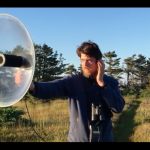
Shana Stewart Deeds receiving a McKeen Award from former Bowdoin President Barry Mills
Shana Stewart Deeds, a Bowdoin lab instructor, last year saw years of hard work pay off when the U.S. government approved a bill to protect two Vermont rivers.
Deeds was the only paid employee for a grassroots organization that formed in 2009 to try to convince the federal government to designate portions of the upper Missisquoi and Trout rivers in northern Vermont “national wild and scenic rivers.” Even after she moved to Maine and began her job at Bowdoin (in 2011), Deeds continued working part-time on the effort.
In December 2014, the U.S. Congress at last voted to include the Vermont rivers in the Wild and Scenic Rivers program, qualifying the waterways for potential federal funds that can help improve water quality, protect native fisheries and increase recreational access. The U.S. has approximately 120 designated rivers, which is fewer than a quarter of one percent of all the nation’s rivers. Ten rivers in New England possess this status, including Maine’s Allagash River.

The sections of the Missisquoi and Trouts rivers that were designated wild and scenic. (The Missisquoi enters Canada north of Vermont, then reenters the U.S., forming the two legs you see here.Trout River is a tributary to Missisquoi River.)
Deeds’ activism in Vermont ties in with her job as a lab instructor for Bowdoin’s biology department and environmental studies program. Along with teaching students natural history, scientific theory and lab techniques, she works with them on developing effective communication skills, both in speech and writing, so they can convey scientific concepts in a clear way to scientists and non-scientists. Deeds said her own communications skills have been sharpened over the years working with a range of stakeholders in Vermont to convince them to join the effort to protect the waterways.
In addition, Deeds draws upon her activism as an example for students of how science can be linked to the common good. “I try to talk about the projects I do outside of here to show them how they can use their scientific knowledge to improve their community beyond college, beyond the Bowdoin bubble,” she said.

Committee Chair Jacques Couture, Shana Stewart Deeds, Vt. Congressman Peter Welch, and Jim MacCartney from the National Park Service
Now that 35.1 miles of the Missisquoi River and 11 miles of the Trout River have been designated and protected, Deeds is resigning from her position with the nonprofit. But her work in this area has not ended. When a group in southern Maine recently reached out to her to see if she could help with its project to secure a wild and scenic designation for York River, Deeds said she was happy to offer advice.
The group in York wants to mimic the partnership model Deeds pursued for the Missisquoi and Trout Rivers. Instead of handing management of the rivers over to a federal authority, such as the National Park Service, the Vermont deal ensures that the rivers remain under the control of local landowners and towns with the National Park Service serving in an advisory role. Deeds said she attended many town meetings in Vermont to reassure nervous landowners that they would retain control over their private property.
A wild and scenic river designation is “the strongest possible protection for a river in the U.S.,” Dave Moryc of American Rivers says. It prohibits new dams or other harmful water development projects, and safeguards clean water.
Moryc additionally praises the work of Deeds and her Vermont group for protecting the Missisquoi and Trout rivers. “[These] rivers…are part of the lifeblood of Vermont’s natural and cultural heritage,” Moryc says. “They are bordered by the largest, and perhaps the highest-quality, silver maple floodplain forest remaining in the state,” and are home to wildlife that includes brook trout, rare freshwater mussels and spiny soft-shell turtles.
Deeds said she is drawn to this type of environmental activism because she is both interested in ecology — she has a master’s degree from University of Vermont’s Field Naturalist Program — and in public outreach and education. She added that she is also “passionate about waterways and water quality, amphibians and reptiles.”
